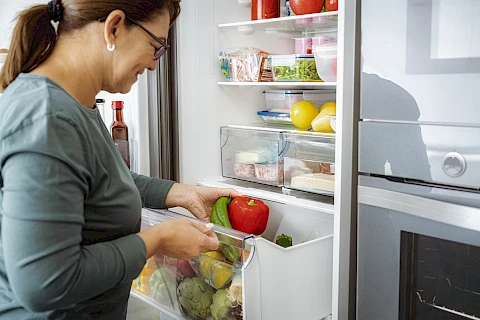
September is National Food Safety Education Month, a time to focus on food safety for everyone. As we age, our bodies become more susceptible to foodborne illnesses, making it crucial to follow safe cooking practices. Learn some tips on proper food storage, handling, and preparation techniques to help seniors stay healthy and safe in the kitchen.
Food Safety Risks for Seniors
Seniors have weakened immune systems, making it harder to fight off infections. This means that seniors are more likely to get sick from foodborne illnesses. Common illnesses like salmonella, E. coli, and norovirus can affect seniors, leading to hospitalization or even death. Understanding these risks is the first step in preventing them.
Proper Food Storage
Keeping food stored correctly helps to avoid illness. You should always keep perishable foods in the refrigerator or freezer. Set the fridge temperature at or below 40°F and the freezer at 0°F. You should store raw meat and seafood on the bottom shelf to avoid juice drips onto other foods. Keep fruits and vegetables in separate drawers. You can label and date leftovers to track how long they've been stored. You should refrigerate leftovers within two hours of cooking. Consume leftovers within three to four days. Reheat leftovers to at least 165°F before eating.
Safe Food Handling Techniques
Proper food handling is key to preventing contamination. Wash hands with soap and water for at least 20 seconds before and after handling food. You must always wash hands after using the bathroom, touching pets, or handling raw meat. Use separate cutting boards for raw meat and vegetables. Clean knives and cutting boards with hot, soapy water after each use. Keep raw meat away from other foods in your grocery cart and fridge. You want to use plastic or non-porous cutting boards for raw meat. Replace cutting boards that have deep grooves as they can harbor bacteria.
Cooking Temperatures and Techniques
Cooking food to the right temperature kills harmful bacteria. Poultry must be cooked to at least 165°F. Ground meats should reach 160°F. Cook fish and shellfish to 145°F. Insert the thermometer into the thickest part of the meat, avoiding bone. Clean the thermometer with hot, soapy water after each use. Ensure foods are cooked evenly, especially when using a microwave. You should stir and rotate food midway through microwaving to avoid cold spots
Senior Helpers Lawrence Can Provide Meal Planning and Prep Services
Practicing safe cooking habits is crucial for seniors to avoid foodborne illnesses. Remember to correctly store food, handle it safely, and cook it thoroughly. Follow these guidelines so seniors can enjoy delicious and safe meals.
Contact Senior Helpers Lawrence today if you or a loved one in Lawrence, Methuen, Andover, or Essex County need assistance with daily tasks, including safe cooking practices. Your health and safety are our top priorities.